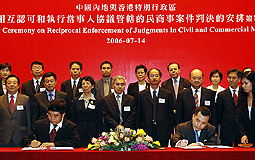
|
| Mutual assistance: Supreme People's Court Vice President Huang Songyou and Secretary for Justice Wong Yan Lung sign an agreement which establishes a new and convenient mechanism for the reciprocal enforcement of judgments made by the two places' courts. |
Hong Kong and the Mainland have signed a mutual legal assistance agreement which establishes a new and convenient mechanism for the reciprocal enforcement of judgments made by the two places' courts.
Under the new arrangement, a judgment creditor will no longer need to spend a large amount of time and money to bring a legal action again in the place where the debtor's property is situated.
Secretary for Justice Wong Yan Lung and Supreme People's Court Vice President Huang Songyou today signed the Arrangement on Reciprocal Enforcement of Judgments in Civil & Commercial Matters.
Appropriate restrictions
Speaking at the signing ceremony, Mr Wong said the new mechanism under the arrangement will be subject to appropriate restrictions in the initial phase.
"The arrangement is only applicable to money judgments on disputes arising from commercial contracts where the parties concerned, on the basis of freedom of contract, have made an agreement in writing in which a court of the Mainland or a court of Hong Kong is expressly designated as the court to have sole jurisdiction for resolving the dispute concerned."
Mr Wong said the judgments to which he referred did not cover all judgments made by any Mainland or Hong Kong courts.
"For the arrangement to be applicable, the judgment must be made, in the case of the Mainland, by an Intermediate People's Court or above, or a Basic People's Court which has been authorised to exercise jurisdiction in civil and commercial cases involving foreign parties; or, in the case of the Hong Kong, by the District Court or above.
"To meet the finality requirements at common law, the Supreme People's Court will lay down a set of special procedures for the retrial of a case in the Mainland, should such a retrial be necessary, where an application for enforcement of the judgment concerned made by a Mainland court has been filed with a Hong Kong court," he said.
Legal profession consulted
The arrangement also stipulates the grounds on which the courts of both places may refuse to enforce a judgment with a view to protecting debtors' interests. Such safeguards are basically the same as those the current laws in Hong Kong provide.
To ensure the arrangement can meet the actual needs of the public, the Government has consulted the Legislative Council's Panel on Administration of Justice & Legal Services, the legal professional bodies and the relevant chambers of commerce.
"On the premise of protecting the interests and freedom of contracting parties, we have taken into full account the laws and legal systems of the two places and drawn reference from similar international laws and practices when devising the new mechanism.
"I believe this mechanism can provide convenience for, and enhance the confidence of people who are involved in business dealings in the two places, and duly address the concerns and issues raised by various sectors," Mr Wong added.
An alternative option
Mr Wong noted that contracting parties will have a further option in future. They may choose to initiate proceedings and apply to the appropriate court for a judgment's enforcement if the situation so warrants, having given due consideration to the place where the debtor's property is situated.
The arrangement should alleviate investors' concerns about litigation and enforcement of judgments and make the business environment of the two places more attractive. It can also strengthen Hong Kong's position as a regional centre for dispute resolution, Mr Wong said.
Mr Huang said the arrangement's signing is a manifestation of the implementation of the Basic Law and a landmark symbolising the ongoing progress of legal assistance between the Mainland and Hong Kong.
|